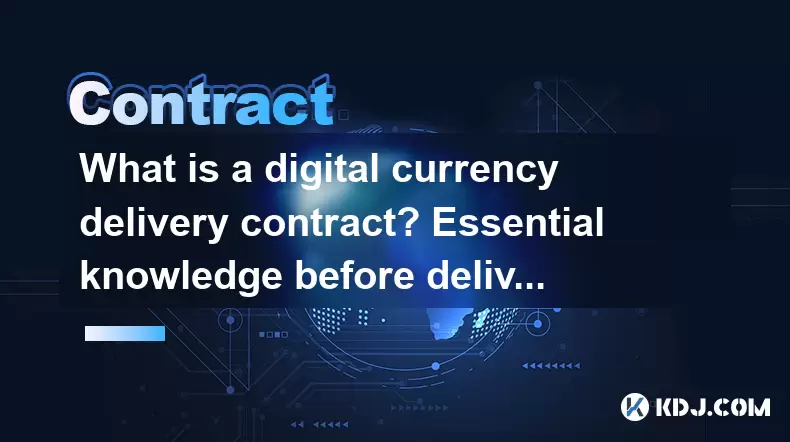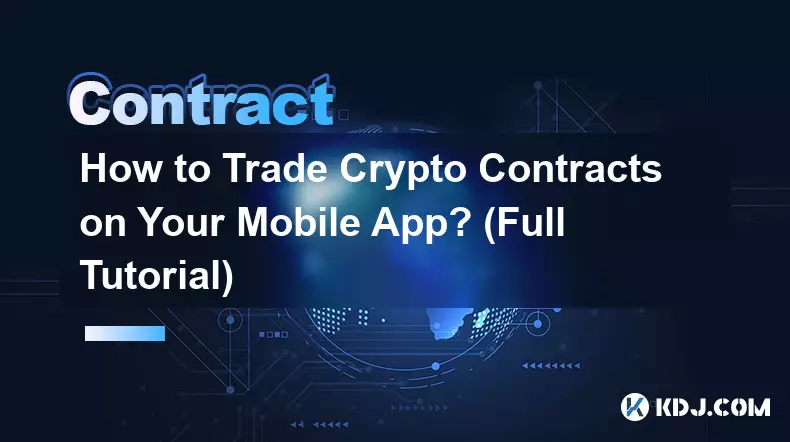-
 bitcoin
bitcoin $87959.907984 USD
1.34% -
 ethereum
ethereum $2920.497338 USD
3.04% -
 tether
tether $0.999775 USD
0.00% -
 xrp
xrp $2.237324 USD
8.12% -
 bnb
bnb $860.243768 USD
0.90% -
 solana
solana $138.089498 USD
5.43% -
 usd-coin
usd-coin $0.999807 USD
0.01% -
 tron
tron $0.272801 USD
-1.53% -
 dogecoin
dogecoin $0.150904 USD
2.96% -
 cardano
cardano $0.421635 USD
1.97% -
 hyperliquid
hyperliquid $32.152445 USD
2.23% -
 bitcoin-cash
bitcoin-cash $533.301069 USD
-1.94% -
 chainlink
chainlink $12.953417 USD
2.68% -
 unus-sed-leo
unus-sed-leo $9.535951 USD
0.73% -
 zcash
zcash $521.483386 USD
-2.87%
What is a digital currency delivery contract? Essential knowledge before delivery
A digital currency delivery contract outlines terms for transferring cryptocurrencies like Bitcoin, ensuring both parties understand their obligations and rights.
May 28, 2025 at 08:56 pm

A digital currency delivery contract is a legal agreement between two parties that outlines the terms and conditions for the delivery of digital currencies, such as Bitcoin, Ethereum, or other cryptocurrencies. This type of contract is crucial in the world of digital assets, as it ensures that both parties understand their obligations and rights regarding the transaction. Before engaging in any digital currency delivery, it's essential to have a thorough understanding of what these contracts entail and how they work.
Key Components of a Digital Currency Delivery Contract
A well-structured digital currency delivery contract includes several key components that define the terms of the agreement. The first component is the identification of the parties involved, which clearly states the names and contact information of both the buyer and the seller. This ensures that there is no confusion about who is responsible for fulfilling the contract.
Another crucial element is the specification of the digital currency to be delivered. The contract should clearly state the type and amount of cryptocurrency involved in the transaction. For example, if the contract is for the delivery of Bitcoin, it should specify the exact number of Bitcoins to be transferred.
The delivery method and timeline are also vital components of the contract. The agreement should outline how the digital currency will be transferred, whether through a cryptocurrency exchange, a peer-to-peer platform, or a direct wallet-to-wallet transfer. Additionally, the contract should specify the expected delivery date or timeframe, ensuring that both parties are on the same page regarding when the transaction should be completed.
Payment terms are another essential aspect of the contract. The agreement should detail how the buyer will pay for the digital currency, whether through traditional fiat currency or another cryptocurrency. It should also outline any fees associated with the transaction and specify the payment deadline.
Lastly, the contract should include clauses related to dispute resolution and termination. These clauses outline the steps to be taken if a disagreement arises between the parties and specify the conditions under which the contract can be terminated. Having clear guidelines for handling disputes and ending the agreement can help prevent misunderstandings and legal issues.
Importance of Legal Review
Before signing a digital currency delivery contract, it's highly recommended to have it reviewed by a legal professional. A lawyer specializing in cryptocurrency transactions can provide valuable insights and ensure that the contract is legally sound. They can help identify any potential issues or loopholes that could lead to problems down the line.
During the legal review, the attorney will examine the contract's language to ensure that it is clear, concise, and free of ambiguity. They will also check that the contract complies with relevant laws and regulations, such as those related to digital asset transactions and consumer protection.
If any issues are identified during the review, the lawyer can suggest modifications to the contract to address these concerns. This might include adding or removing clauses, clarifying certain terms, or adjusting the payment and delivery schedules. By having a legal professional review the contract, you can have greater confidence that your rights and interests are protected.
Ensuring Secure Delivery of Digital Currency
One of the primary concerns when dealing with digital currency delivery is ensuring the security of the transaction. To protect your digital assets, it's crucial to use secure methods for transferring cryptocurrencies. This includes using reputable cryptocurrency exchanges or peer-to-peer platforms that have robust security measures in place.
When using an exchange, make sure to enable two-factor authentication (2FA) on your account. This adds an extra layer of security by requiring a secondary verification method, such as a code sent to your mobile device, in addition to your password.
If you're using a peer-to-peer platform, take the time to research the platform's security features and user reviews. Look for platforms that have a strong track record of secure transactions and offer dispute resolution services in case of any issues.
For direct wallet-to-wallet transfers, ensure that you are using a secure and reputable digital wallet. Always double-check the recipient's wallet address before initiating the transfer, as cryptocurrency transactions are irreversible and sending funds to the wrong address can result in permanent loss of your assets.
Verifying the Authenticity of the Digital Currency
Before accepting delivery of any digital currency, it's essential to verify its authenticity. Cryptocurrencies are decentralized and not backed by any government or financial institution, which means that the responsibility for verifying the legitimacy of the assets falls on the recipient.
One way to verify the authenticity of digital currency is by checking the transaction history on the blockchain. Each cryptocurrency transaction is recorded on a public ledger known as the blockchain, which allows you to trace the origin and movement of the funds. By examining the transaction history, you can ensure that the digital currency you're receiving has not been involved in any suspicious or fraudulent activities.
Another method of verification is to use a cryptocurrency analysis tool or service. These tools can provide detailed insights into the age, source, and risk level of the digital currency. Some services even offer real-time monitoring and alerts for any suspicious activity related to the assets you're receiving.
Handling Disputes and Non-Delivery
Despite the best efforts to create a clear and comprehensive digital currency delivery contract, disputes and issues with non-delivery can still arise. In the event of a dispute, it's crucial to refer back to the contract's dispute resolution clause. This clause should outline the steps to be taken to resolve the disagreement, such as mediation, arbitration, or legal action.
If the issue is related to non-delivery of the digital currency, the first step is to communicate with the other party to understand the reason for the delay or failure to deliver. It's possible that there may be a legitimate reason for the delay, such as technical issues or a problem with the payment.
If the issue cannot be resolved through communication, you may need to escalate the matter to the platform or exchange where the transaction took place. Many reputable cryptocurrency platforms have dispute resolution processes in place to help mediate conflicts between buyers and sellers.
In cases where the platform or exchange is unable to resolve the issue, you may need to seek legal assistance. A lawyer experienced in cryptocurrency disputes can help you navigate the legal system and pursue the appropriate course of action to recover your assets.
Frequently Asked Questions
Q: Can a digital currency delivery contract be used for any type of cryptocurrency?A: Yes, a digital currency delivery contract can be used for any type of cryptocurrency, including Bitcoin, Ethereum, Litecoin, and others. The key is to ensure that the contract clearly specifies the type and amount of cryptocurrency involved in the transaction.
Q: What happens if the value of the digital currency changes between the time the contract is signed and the time of delivery?A: The contract should specify whether the agreed-upon amount of digital currency is fixed or if it's based on a specific fiat currency value at the time of delivery. If the value changes, the parties may need to renegotiate the terms of the contract or proceed with the original agreement, depending on what is specified in the contract.
Q: Is it necessary to have a digital currency delivery contract for every cryptocurrency transaction?A: While not every cryptocurrency transaction requires a formal contract, having a digital currency delivery contract is highly recommended for larger or more complex transactions. It provides a clear legal framework and helps protect the interests of both parties involved in the transaction.
Q: Can a digital currency delivery contract be enforced in court?A: The enforceability of a digital currency delivery contract in court depends on various factors, such as the jurisdiction, the clarity of the contract terms, and whether the contract complies with relevant laws and regulations. In general, a well-drafted and legally sound contract has a better chance of being enforced in court if a dispute arises.
Disclaimer:info@kdj.com
The information provided is not trading advice. kdj.com does not assume any responsibility for any investments made based on the information provided in this article. Cryptocurrencies are highly volatile and it is highly recommended that you invest with caution after thorough research!
If you believe that the content used on this website infringes your copyright, please contact us immediately (info@kdj.com) and we will delete it promptly.
- MicroStrategy's Bitcoin Strategy: Saylor Navigates Crypto Winter, Pledges Quantum Security for Digital Gold
- 2026-02-07 01:10:01
- Binance and Bybit Face Withdrawal Glitches Amidst Market Volatility; Binance Boosts SAFU Fund
- 2026-02-07 01:20:02
- Ohio Strikes Gold: Prestigious Coin Collection Finds New Home in Toledo
- 2026-02-07 01:25:01
- Polymarket's "POLY" Token and Airdrop Speculation Heats Up Amidst Trademark Filings
- 2026-02-07 01:20:02
- Super Bowl 60 Coin Toss: Betting Prop Frenzy and Historical Flips
- 2026-02-07 01:15:01
- Bitfarms Makes a Bold US Move, Pivoting from Bitcoin to AI Infrastructure
- 2026-02-07 01:10:01
Related knowledge

How to Use Price Action Trading for Crypto Perpetual Contracts?
Feb 06,2026 at 03:20pm
Understanding Price Action Fundamentals1. Price action trading relies entirely on raw market data—candlestick formations, support and resistance level...

How to Trade Crypto Contracts on Your Mobile App? (Full Tutorial)
Feb 07,2026 at 02:59am
Setting Up Your Mobile Trading Environment1. Download the official mobile application from the exchange’s verified website or trusted app store listin...

How to Manage Emotions and "Revenge Trading" in Futures?
Feb 05,2026 at 12:19am
Understanding Emotional Triggers in Futures Markets1. Market volatility directly impacts psychological states, often amplifying fear or euphoria based...

How to Use Candle Close Confirmation for Futures Entry?
Feb 05,2026 at 04:20pm
Understanding Candle Close Confirmation1. A candle close confirmation occurs when the final price of a candlestick settles beyond a predefined level, ...

How to Master "Position Sizing" to Prevent Total Account Wipeout?
Feb 06,2026 at 12:00am
Market Volatility Patterns1. Bitcoin price swings often exceed 10% within a 24-hour window during high-liquidity events such as ETF approval announcem...

How to Analyze Market Sentiment Using the Fear and Greed Index?
Feb 05,2026 at 07:40am
Understanding the Fear and Greed Index1. The Fear and Greed Index is a composite metric designed to quantify prevailing emotional states among cryptoc...

How to Use Price Action Trading for Crypto Perpetual Contracts?
Feb 06,2026 at 03:20pm
Understanding Price Action Fundamentals1. Price action trading relies entirely on raw market data—candlestick formations, support and resistance level...

How to Trade Crypto Contracts on Your Mobile App? (Full Tutorial)
Feb 07,2026 at 02:59am
Setting Up Your Mobile Trading Environment1. Download the official mobile application from the exchange’s verified website or trusted app store listin...

How to Manage Emotions and "Revenge Trading" in Futures?
Feb 05,2026 at 12:19am
Understanding Emotional Triggers in Futures Markets1. Market volatility directly impacts psychological states, often amplifying fear or euphoria based...

How to Use Candle Close Confirmation for Futures Entry?
Feb 05,2026 at 04:20pm
Understanding Candle Close Confirmation1. A candle close confirmation occurs when the final price of a candlestick settles beyond a predefined level, ...

How to Master "Position Sizing" to Prevent Total Account Wipeout?
Feb 06,2026 at 12:00am
Market Volatility Patterns1. Bitcoin price swings often exceed 10% within a 24-hour window during high-liquidity events such as ETF approval announcem...

How to Analyze Market Sentiment Using the Fear and Greed Index?
Feb 05,2026 at 07:40am
Understanding the Fear and Greed Index1. The Fear and Greed Index is a composite metric designed to quantify prevailing emotional states among cryptoc...
See all articles










































































